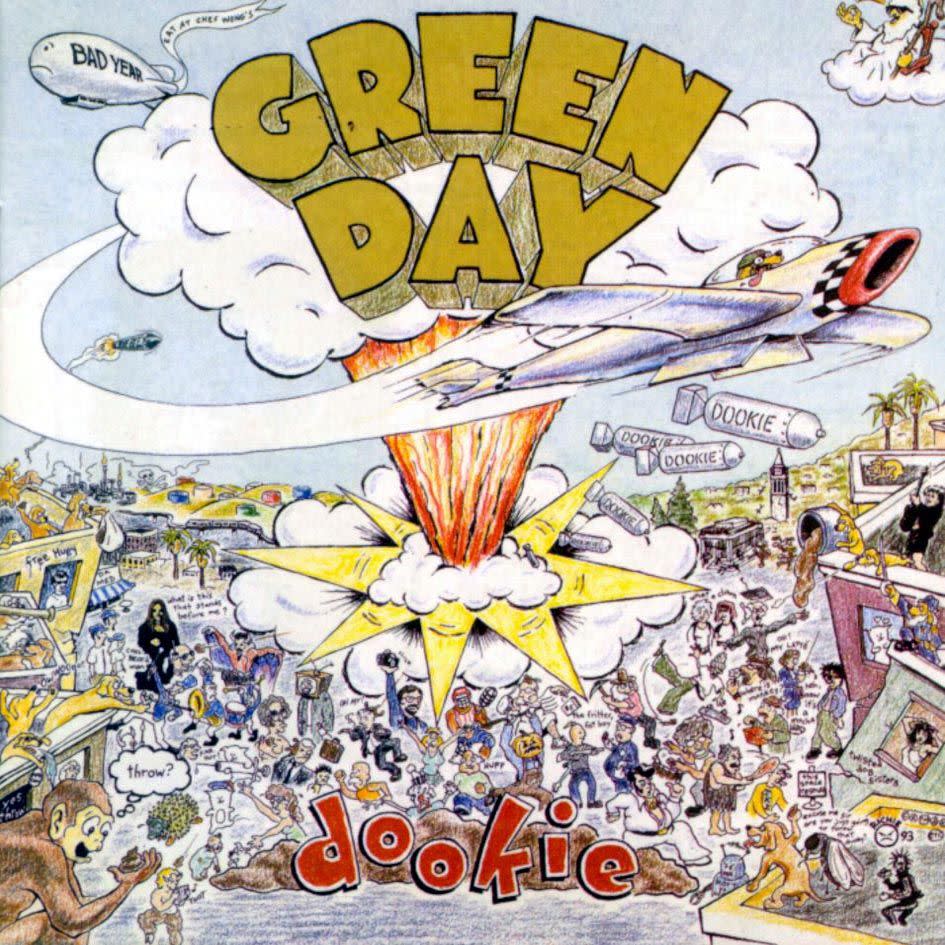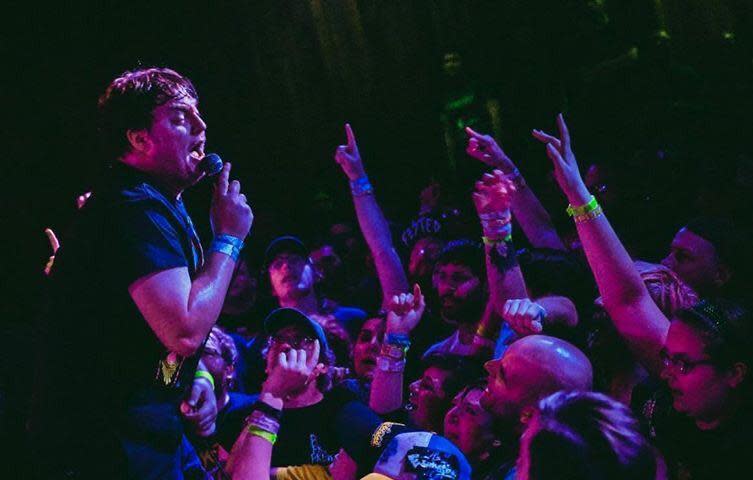Artists Reflect on 25 Years of Green Day’s Dookie
This week marks the 25th anniversary of Dookie, the record from East Bay punk trio Green Day that brought punk back into the mainstream, inspired a decade of mall-punk imitators, and gave zealous teens everywhere one more chance to debate the meaning of the word “sellout.”
To mark the occasion, we’ve asked a few of our favorite older and new artists from across the last quarter-century to reflect on Green Day’s major-label breakthrough and to help us find a little new perspective on a record that, whether we realize it or not, many of us still know by heart.
As it turns out, it was anything but pulling teeth to get them to come clean…
__________________________________________________________
First Impressions of Green Day and Dookie
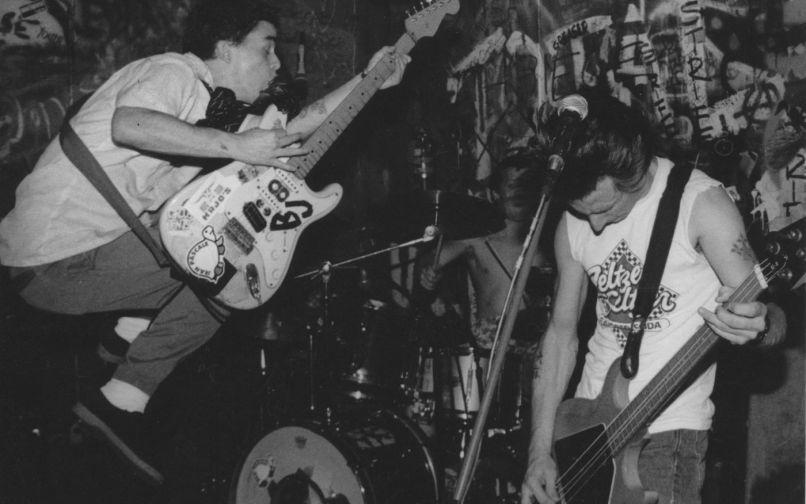
Green Day at 924 Gilman by Murray Bowles
Jon Ginoli (Pansy Division): I first encountered Green Day when their first album came out, because I was a sales rep for Rough Trade Distribution. I was in their San Francisco office, and we distributed a lot of smaller labels, and people were asking for two records: Green Day and Operation Ivy. They seemed to have gotten to be popular sellers without any kind of advertising or promotions. For me, it was kind of like, “I don’t know who these bands are!” They seemed to have come out of nowhere.
I did try to go see them, but I lived in San Francisco, and I didn’t have a car, and they didn’t play in San Francisco that much. They would play in the East Bay, but getting back from the East Bay at night without a car was difficult. There was a little bar by my house where bands from Dischord or K would play, and they were supposed to play there twice, and both times they canceled. When I asked them about it later after I met them, they said, “Yeah, we didn’t really like crossing the bridge.” For one of those shows, they had just decided to get stoned and stay home.
Hutch Harris (ex-The Thermals): I graduated high school in ’93. My parents kicked me out of the house in ’95. So, ’94 was like the last year for me, where I was living at my parents’ house and pretending to go to junior college but not really going. My memories of that last year are just, like, hiding out in my bedroom at my parents’ house and getting really stoned and listening to In Utero and Dookie.

Melkbelly by Lenny Gilmore
Miranda Winters (Melkbelly): I got Dookie kind of late. Maybe ’99 or 2000. I got this album mainly because the house that my family lived in at the time was next door to this apartment complex, and there was this young, cool mom that lived there. She was always giving me great albums. I was, like, instantly obsessed with this album.
When she gave it to me, it was around the same time that I got a karaoke machine. I don’t know if this is legal, but I took all the tracks, took out all the vocals, and would re-record with a tape recorder myself singing all the songs and playing different guitar parts over it. The tapes are super embarrassing, obviously, but I learned a lot from this album.
Luke Gunn (Dollar Signs): I heard it for the first time in full in the van just now. I wasn’t allowed to listen to Green Day because they supported John Kerry when he ran against George W. Bush.
__________________________________________________________
What Makes Dookie Great
Harris: Obviously those first two LPs on Lookout! are super good, but the songs on Dookie are just tightened up. [Billie Joe Armstrong] stopped doing solos. There’s a bunch of solos all over those first couple records, and it sounds like he made a conscious effort to be like, “I’m not gonna solo.” It’s like a punk record for the grunge era.
Shehzaad Jiwani (Greys): I think “Welcome to Paradise” is probably the best song on the record. It totally captures what it’s like to grow up in the suburbs as a bored, alienated, creative but not really given that outlet kind of kid. I absolutely had that type of childhood, and I know pretty much all of my friends did, too. It really puts you there, and it celebrates it and condemns it at the same time. It’s like a rallying cry for people who grew up in a place like that.
Sonically, I think that record sounds way better than the first two records. It’s got that really lush, dense production, which makes sense as far as Green Day being a stoner band, because when you’re 16 and blasted, that record just sounds so good. If you’re going to sign to a major, go for that major-label production. It’s the same way Sonic Youth’s Dirty kind of has that same really lush, stoner-y sound.

Greys
Dylan Wachman (Dollar Signs): You can tell there was a lot of trust and leniency the production process. Even though it was a major release, it still has that young snotty attitude. It made punk a more accessible subculture, and brought it into living rooms (which I guess could be both a good and bad thing). The Descendents weren’t doing that. Black Flag didn’t do that. Green Day did that.
Jiwani: I think it’s really interesting that he’s writing all these really, really major-key songs like “Basket Case”, but he’s literally talking about losing his mind and his own mental health. I think Billie Joe’s been very vocal about surviving that kind of stuff. There’s a kind of rawness and realness to the early Green Day stuff. It’s simple, but it’s not stupid.
__________________________________________________________
Dookie On Tour

Pansy Division
Ginoli: When Dookie first came out, it took a couple months to really get off the ground. Then, the “Longview” video hit MTV, and they kind of exploded. By the time they asked us to go on tour with them (which was July ’94), “Longview” was a hit, but they had booked the tour before the video had taken off. Suddenly, they were presented with venues that were far smaller than they should be playing. With the exception of a couple of shows in Canada, everything was sold out. WAY sold out. You could just see them getting more popular every week.
So, we played with them in July and August, and then they went to Europe. But then, they came back to the states and played arenas, and we got to do those shows. So, we did two tours in ’94: smaller places and then gigantic places.
It was an adjustment to go from 100 seats to 1,000 seats. It was another adjustment to go from 1,000 to 10,000 or 15,000.
The audience reaction to us from Green Day was very mixed most of the time. There would be people who were really into us and people who were really offended and irritated by us. Remember, most of Green Day’s audience, at those shows and at that time, were between 12 and 18. There was almost no one older than that. A lot of teenage boys did not like the in-your-face gay Pansy Division approach. We did not back down in the face of the negative reactions we got, and I think Green Day really respected us for that. They would go onstage some nights and say, “You people who booed Pansy Division: you’re wrong! They’re a great band!”
Green Day said to us, and to other people who asked, that one of the reasons they had us open for them was that they suddenly became a mainstream band almost overnight and realized that people in the mainstream had different thoughts about what a rock band was than people who were in the indie and punk underground. So, having us open for them was making a statement. Having the kind of people that we were — an openly gay, very unapologetic, blunt rock band — open for them said something about their values.

Green Day from In the Early Days documentary
They really did have our backs. I have nothing bad to say about my experience with Green Day. They really were fantastic to us.
__________________________________________________________
Dookie’s Influence
Harris: When I was in The Thermals, we would call Dookie “the Bible.” It was like the guidebook on how to write the perfect pop-punk record. The first rule is that it’s shameless, you know? If you’re going to sign to a major label when you’re coming out of that culture, you might as well go all the way with it. Don’t be half-assed about it.
Winters: First of all, this album is, what, not even 40 minutes long? I think that is something that really connects with me, because I love short shit. As individual songs, they’re just like these great little packages. They’re so concise.

Hutch Harris by Autumn Andel
Harris: There’s no fat on any of the songs. You never feel like the record is lagging. On a lot of records in the ’90s, Side B would have some six-minute song with spoken-word samples and all this garbage. They don’t do that.
Winters: A lot is being said, but with this musical backing that feels to me like, exciting but also attainable. It’s familiar, like something maybe I felt like, “Oh. I could do this!” I also feel like the lyrics on this album in particular fit with what I was up to at that moment.
Harris: Even the hidden track on Dookie is short and funny and … I don’t know if it’s to the point, but it’s not “Endless, Nameless.”
__________________________________________________________
Did Green Day Sell Out?
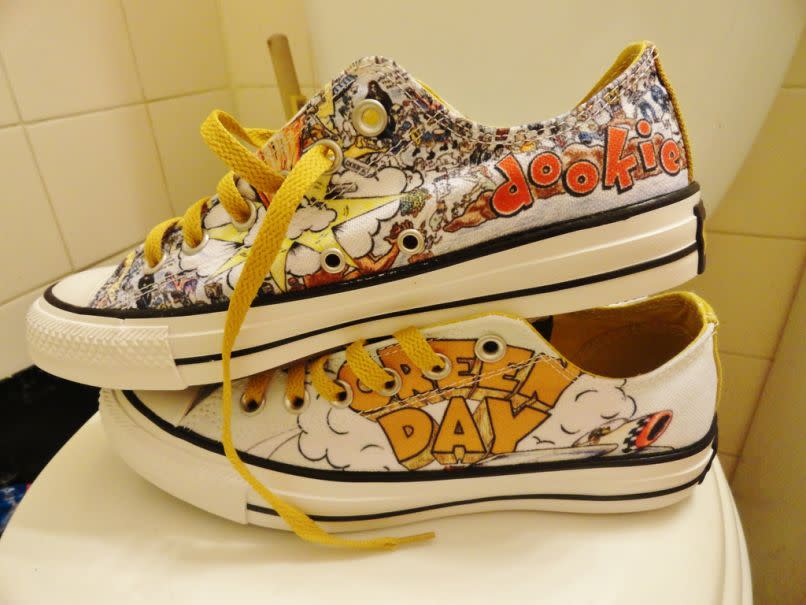
Converse Dookie Kicks
Harris: The weird thing was that, in the punk community, it was kind of taboo to like that record. There were so many people that were so mad at Green Day, or that hated Green Day for selling out, for leaving Lookout! and getting on a major label. A lot of my friends loved 39/Smooth and Kerplunk and hated Dookie just for political reasons. It was like a guilty pleasure, which now, looking back, is so ridiculous.
Ginoli: They were sensitive to the criticism of being sellouts.
Winters: I remember both hearing about that and talking about that with my friends at the time. How, like, they’re calling themselves punk, but you know. I don’t want to offend anyone, but I don’t know that I would call them punk.
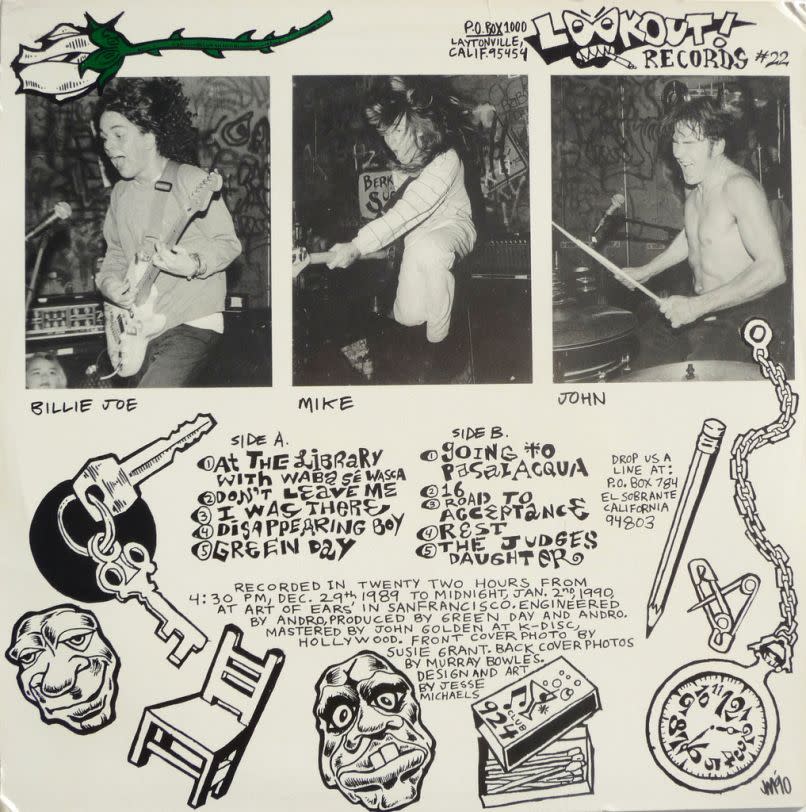
Ginoli: The thing about selling out is, do you go to a bigger label and change your sound, try to sound more commercial, or do something that you wouldn’t have done otherwise? Green Day did exactly what they were going to do anyway. They just did it on a bigger stage. I don’t feel like they were sellouts for doing what they did. They didn’t compromise, and that’s part of their story that you maybe need to remind people of. They were true to themselves wherever they were.
Harris: A lot of those people I know eventually came around, just like they came around on a bunch of other bands, like Jawbreaker or whoever, that had “sold out.” Something being taboo or a guilty pleasure, to me, only makes it more enjoyable, so that made me like it even more. I can’t not like something just to fit in.
__________________________________________________________
Green Day and Dookie’s Legacy
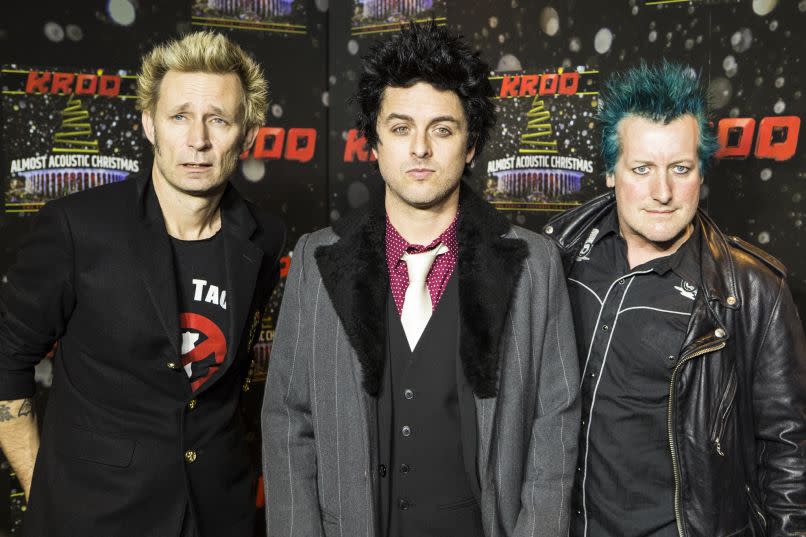
Green Day by Philip Cosores
Jiwani: Culturally, I think Dookie is important because it introduced a generation of kids to punk music in a way that Nirvana didn’t, for better or worse. It’s a lot of people’s gateway. I don’t think that, in the wake of Nirvana, Dookie is particularly subversive or challenging, or at least it shouldn’t be. It’s kind of telling that, as a seven-year-old, I understood everything that Dookie was about. It’s for kids. It’s alt-rock for literal kids.
I’m probably the wrong person to ask. I like Dookie just fine, but I don’t think that it led to a lot of great music. I fuckin’ hate pop-punk music, and Dookie’s probably to blame for a lot of that stuff.
Winters: I feel like this album is definitely a stepping stone. I think I would give it to a pre-adolescent or adolescent even now. I think it’s definitely music to be considered in the grand scheme of pop and punk. But where does Green Day fit? I don’t know. They’re fascinating. I’d hate for people to write them off because of what’s up now. But I also feel that way about Everclear, so.

Dollar Signs
Ginoli: When Green Day asked us to open for them, it was this opportunity that we didn’t think we would have — one, to play for a younger audience, and two, to play for a bigger audience. I think that we would’ve continued to do well and gained fans if Green Day had never asked us to open for them, but the fact that they did really made us much better known and opened a lot more doors than I think would’ve happened otherwise. The people who were 12 to 18 in 1994 — that’s still our biggest fan group, because that’s when most people saw us. We’re still around, and that’s partly because Green Day helped us reach an audience, some of whom stuck with us over the years. As [Pansy Division bassist Chris Freeman] and I have said hundreds of times: for our band and our lives, Green Day is a gift that just keeps giving.
Wachman: When I think of the biggest punk records of the ’70s and ’80s, I think of The Clash and Black Flag. When I think of the biggest punk records of the ’90s, I think of Green Day. They owned that decade.
